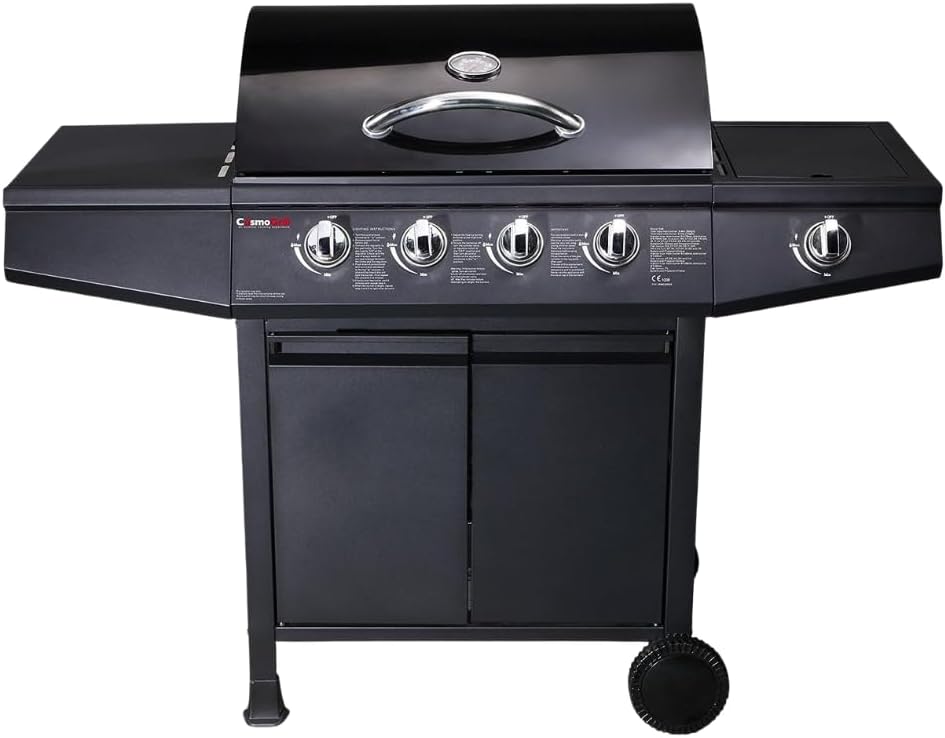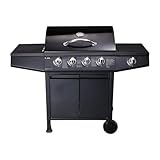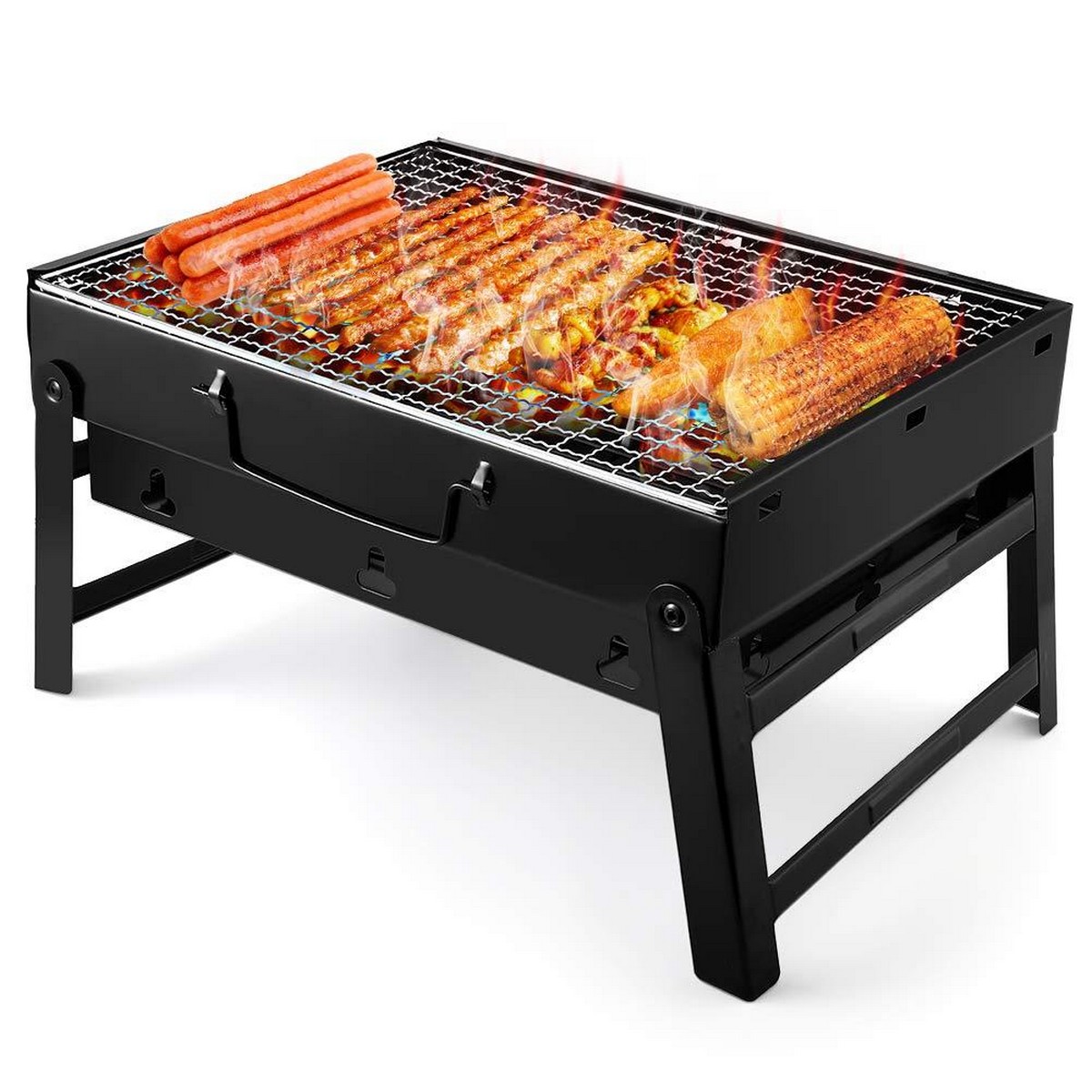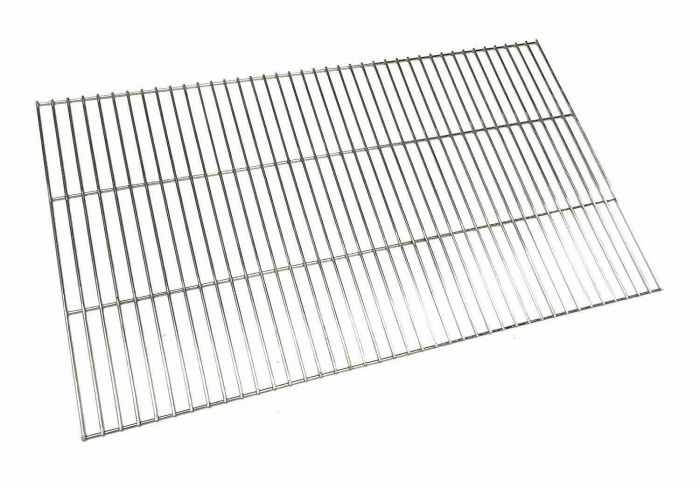Introduction to BBQ Grills BBQ grills are essential equipment for outdoor cooking and social gatherings,…

The Ultimate Guide to Gas Barbecues
Gas barbecues are a popular choice for outdoor cooking enthusiasts in the UK. They offer convenience, speed, and consistent heat, making them ideal for everything from quick weekday dinners to large garden parties. This guide will explore the different types of gas barbecues, their benefits, key considerations when buying one, usage tips, pros and cons, shopping online, pricing, discounts, frequently asked questions, and maintenance tips.
Types of Gas Barbecues
Gas barbecues come in various styles and sizes to suit different needs and preferences:
- Portable Gas Barbecues: These compact and lightweight models are perfect for small spaces, camping trips, or picnics. They usually have one or two burners and are easy to transport.
- Two-Burner Gas Barbecues: Ideal for small families or couples, two-burner models offer a good balance of cooking space and portability. They are suitable for balconies, patios, and small gardens.
- Three to Four-Burner Gas Barbecues: These are the most popular models, offering ample cooking space and versatility. They are great for medium to large families and can handle a variety of foods simultaneously.
- Built-In Gas Barbecues: These are designed to be integrated into outdoor kitchens. They offer a high-end, permanent solution for serious outdoor cooking enthusiasts.
- Hybrid Gas Barbecues: Combining gas and charcoal, these models offer the convenience of gas cooking with the option to add charcoal for a smoky flavour. They are perfect for those who want the best of both worlds.
Benefits of Gas Barbecues
Gas barbecues offer several advantages that make them a popular choice:
- Convenience: Gas barbecues are easy to start and heat up quickly, allowing you to begin cooking almost immediately.
- Temperature Control: Gas barbecues offer precise temperature control, making it easier to cook food evenly and avoid burning.
- Cleaner Cooking: Gas barbecues produce less smoke and ash compared to charcoal grills, resulting in a cleaner cooking experience.
- Consistency: Gas barbecues provide consistent heat, making it easier to achieve perfect cooking results every time.
- Versatility: Many gas barbecues come with additional features like side burners, rotisserie kits, and warming racks, enhancing their versatility.
- Low Maintenance: Gas barbecues are generally easier to clean and maintain compared to charcoal grills.
Key Considerations When Buying a Gas Barbecue
When choosing a gas barbecue, consider the following factors to ensure you make the right choice:
- Size: Consider the amount of cooking space you need. Larger grills are ideal for entertaining, while smaller models are suitable for everyday use.
- Number of Burners: More burners offer greater cooking flexibility. Two to four burners are suitable for most households, while larger grills with more burners are ideal for serious grillers.
- Material: Look for durable materials like stainless steel or cast iron, which can withstand the elements and provide long-lasting performance.
- Features: Consider additional features like side burners, warming racks, rotisserie kits, and storage cabinets to enhance your grilling experience.
- Fuel Type: Most gas barbecues use propane or natural gas. Ensure you have the appropriate fuel source for your chosen model.
- Portability: If you plan to move your barbecue frequently, look for models with wheels and handles for easy transport.
- Budget: Gas barbecues come in a range of prices. Set a budget and look for models that offer the best value within your price range.
Buying Guide
Follow these steps to choose the perfect gas barbecue for your needs:
- Assess Your Needs: Determine how often you will use the barbecue, the number of people you typically cook for, and the types of food you enjoy grilling.
- Set a Budget: Establish a budget and look for models that offer the best features and quality within your price range.
- Research Brands: Look for reputable brands known for quality and reliability. Read reviews and customer feedback to get an idea of their performance and durability.
- Compare Features: Compare the features of different models, including the number of burners, cooking space, additional features, and materials.
- Check Warranty: Ensure the barbecue comes with a warranty to protect against defects and ensure peace of mind.
- Visit Showrooms: If possible, visit showrooms to see the barbecues in person and get a feel for their build quality and features.
- Consider Assembly: Some gas barbecues require assembly. Ensure you are comfortable with the assembly process or consider hiring a professional.
Pros and Cons of Gas Barbecues
Here’s a quick overview of the advantages and disadvantages of gas barbecues:
- Pros:
- Quick and easy to start
- Precise temperature control
- Consistent heat distribution
- Cleaner cooking with less smoke
- Low maintenance
- Versatile features for various cooking methods
- Cons:
- Higher initial cost compared to charcoal grills
- Less smoky flavour compared to charcoal
- Requires a fuel source (propane or natural gas)
- Can be bulky and require storage space
Usage Tips
Maximise the performance and longevity of your gas barbecue with these usage tips:
- Preheat Properly: Allow the barbecue to preheat for 10-15 minutes before cooking to ensure even heat distribution.
- Clean Grates Regularly: Clean the grates after each use to remove residue and prevent flare-ups. Use a grill brush and soapy water for best results.
- Check for Leaks: Regularly inspect the gas connections and hoses for leaks. Use a soapy water solution to check for bubbles indicating a leak.
- Use a Drip Pan: Place a drip pan under the cooking area to catch grease and prevent flare-ups. Empty and clean the pan regularly.
- Keep the Lid Closed: Keep the lid closed while cooking to maintain consistent heat and reduce cooking time.
- Control Flare-Ups: Move food to a cooler part of the grill if flare-ups occur. Keep a spray bottle of water nearby to extinguish small flames.
- Monitor Fuel Levels: Keep an eye on propane levels or ensure your natural gas connection is secure to avoid running out of fuel mid-cook.
Shopping Online
Buying a gas barbecue online offers convenience and a wide range of options. Here’s how to navigate online shopping:
- Choose Reputable Retailers: Buy from well-known online retailers with positive reviews and a history of quality products. Look for detailed product descriptions and images to assess the barbecue’s features.
- Read Product Details: Pay attention to specifications such as cooking space, number of burners, and additional features. Ensure the barbecue meets your needs and expectations.
- Check Images: View multiple images, including close-ups and lifestyle shots, to get a clear idea of the barbecue’s appearance and features.
- Read Customer Reviews: Look for reviews that discuss performance, durability, and overall satisfaction. Reviews provide valuable insights into potential issues or benefits.
- Compare Prices: Compare prices across different retailers to find the best deal. Consider additional costs like delivery charges or potential discounts.
- Understand Return Policies: Check the retailer’s return and exchange policies in case the barbecue does not meet your expectations or arrives damaged.
- Look for Deals: Sign up for newsletters or check websites for sales and special offers. Many retailers offer discounts during seasonal sales or promotional events.
Prices
Prices for gas barbecues in the UK vary based on factors like size, number of burners, and additional features. Here’s a general price range:
- Portable Gas Barbecues: £50 – £200
- Two-Burner Gas Barbecues: £150 – £400
- Three to Four-Burner Gas Barbecues: £300 – £800
- Built-In Gas Barbecues: £500 – £2,000
- Hybrid Gas Barbecues: £400 – £1,000
Consider your budget and explore options within your price range. Evaluate the barbecue’s quality, features, and customer reviews to ensure you’re getting the best value for your money.
Coupons and Discounts
Save money on gas barbecues by exploring these opportunities:
- Subscribe to Newsletters: Sign up for retailer newsletters to receive exclusive discounts, promotional codes, and notifications about upcoming sales.
- Seasonal Sales: Look for discounts during major sales events like Black Friday, Cyber Monday, or end-of-season sales.
- Use Coupon Websites: Visit sites like VoucherCodes or HotUKDeals to find current coupons and deals for barbecue retailers.
- Check Clearance Sections: Browse clearance or outlet sections on retailer websites for discounts on overstocked or last-season models.
Frequently Asked Questions
- Q: How do I maintain a gas barbecue?A: Regular maintenance includes cleaning the grates, checking for gas leaks, emptying the drip pan, and inspecting burners for clogs. Follow the manufacturer’s instructions for detailed maintenance guidelines.
- Q: Can I use a gas barbecue indoors?A: No, gas barbecues are designed for outdoor use only due to the risk of carbon monoxide poisoning and fire hazards.
- Q: How long does a gas barbecue last?A: With proper care and maintenance, a quality gas barbecue can last 5-10 years or more. The lifespan depends on the materials, frequency of use, and maintenance practices.
- Q: What type of gas should I use for my barbecue?A: Most gas barbecues use propane, which is readily available in refillable tanks. Some models can be connected to a natural gas line for a continuous supply of fuel.
- Q: How do I store my gas barbecue during winter?A: Clean the barbecue thoroughly, disconnect the gas supply, and cover it with a weather-resistant cover. Store the barbecue in a dry, sheltered location to protect it from the elements.
Caring for Your Gas Barbecue
Proper care and maintenance can extend the life of your gas barbecue:
- Clean Regularly: Clean the grates and interior surfaces after each use to remove grease and residue. Use a grill brush and soapy water for best results.
- Check for Leaks: Regularly inspect the gas connections and hoses for leaks. Use a soapy water solution to check for bubbles indicating a leak.
- Protect from Weather: Use a weather-resistant cover to protect the barbecue from rain, snow, and UV damage when not in use.
- Store Properly: Store the barbecue in a dry, sheltered location during winter or prolonged periods of non-use.
- Follow Manufacturer Instructions: Always follow the manufacturer’s care and maintenance guidelines for the best results and to ensure the longevity of your barbecue.
Conclusion
Gas barbecues offer a convenient, efficient, and versatile solution for outdoor cooking. By considering factors such as size, number of burners, and additional features, you can choose the perfect barbecue to meet your needs. Shopping online provides a wide range of options and potential savings through discounts and deals. With proper care and maintenance, a gas barbecue can provide many years of enjoyable cooking experiences.

























